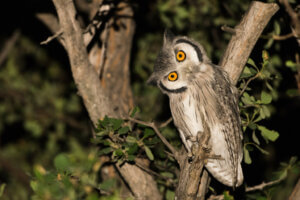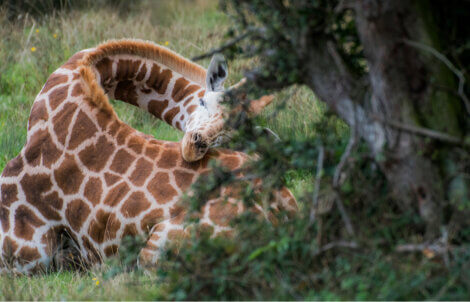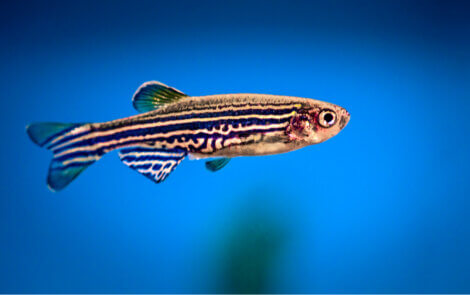Are There Any Animals that Don't Sleep?

Sleeping isn’t just about taking a rest. Falling asleep initiates a whole series of processes that help the body to recover and ensure that bodily functions work properly. Furthermore, when sleeping, a number of important neurological functions take place which are important for brain activity, memory, and learning. But, despite all this, it might appear to you that some animals don’t sleep at all…
However, as surprising as it might seem, there are no animals that don’t sleep, but how and how much they sleep can vary hugely. Whilst some animals, like koalas, sleep more than 20 hours a day, others only need to sleep for a few minutes.
Why do we need to sleep?
Sleeping is a vital process for all animals, and a lack of sleep can have consequences for various bodily functions. Even bees have shown abnormal and erratic behavior if they are deprived of sleep.
When we sleep, the brain doesn’t just get a rest from the various stimuli in our surroundings. It also “works” at night, consolidating individual memories and anything that has been learned during the day.
Are there any animals that don’t sleep?
In nature, there are certainly a number of animals that sleep very few hours or even just a few minutes and are still able to survive perfectly fine. This is the result of their environment and their way of life. Let’s look at some examples:
Giraffes only sleep a couple of hours a day
These large herbivores only need to sleep between two and four hours a day to get enough rest. However, even so, they don’t sleep for long periods and the longest period of rest doesn’t tend to exceed two hours.
Giraffes sleep in short intervals of around ten minutes, and the majority of this time tends to be light sleep where they remain standing. When they go into a deep sleep, they rest their heads on their back, but this will only happen for a fraction of their total rest each day.
Why do they sleep for such short periods of time? Giraffes are much more vulnerable if they sleep lying down. If a predator appears, those few seconds to stand up again could make the difference between life and death.
This behavior is also seen in other animals like elephants, horses, and sheep, who are also prey for other animals.
Another theory that aims to explain this peculiar sleep pattern is their eating habit. Like other ruminant animals, giraffes spend most of the day eating. Instead of sleeping for many hours at a time, they can alternate between eating and sleeping in short periods.

Birds and dolphins can sleep with the brain half-awake
A question that always intrigued scientists was whether or not animals that spend most of their time in the air or the water were able to sleep. The answer lies in unihemispheric slow-wave sleep (USWS).
This is a way of sleeping that birds and aquatic mammals have developed to survive. Dolphins, for example, sleep with one hemisphere of the brain still awake. The two hemispheres of the brain alternate, which allows the brain to rest completely whilst they can still breathe, swim (or fly) at the same time.
Whilst one hemisphere of the brain sleeps, the other stays conscious enough so that they return to the surface for oxygen. Added to this, they also sleep with only one eye open, on the opposite side to the side of the brain that is asleep.
Do insects sleep?
Insects also sleep, but there many differences between the different insect groups. For example, as tireless as they may seem, ants sleep for more or less four hours a day, but this is divided into 250 naps of around a minute at a time.
This is the sleep pattern of the worker and soldier ants. However, the queen sleeps for a much longer period of time. Certainly, even sleep is a privilege in the animal kingdom.
And fish? Do they sleep too?
Fish don’t need to come to the surface to breathe like aquatic mammals do, but they are much more vulnerable to predators when they’re asleep. As with other animals, there are many different sleep habits. Some fish sleep during the day, others at night, and others at twilight.
The majority of fish look for a place to hide, stop swimming, and reduce their metabolic activity. It’s more of a rest than sleep, per se.
However, they sleep more or less in the same way that other animals do, except they never enter deep sleep (there’s no REM phase). Or at least, we didn’t think so until now.
Recent studies have documented, for the first time, REM sleep in the brains of zebrafish, which is a key animal for genetic studies. In fact, these fish, with which we share a large part of our genes, show sleep patterns that are very similar to humans.

As you can see, there aren’t any animals that don’t sleep at all, particularly if we define sleep as a period of rest that reduces metabolic activity. But even so, various animals have evolved their sleep patterns and habits in quite amazing ways.
Sleeping isn’t just about taking a rest. Falling asleep initiates a whole series of processes that help the body to recover and ensure that bodily functions work properly. Furthermore, when sleeping, a number of important neurological functions take place which are important for brain activity, memory, and learning. But, despite all this, it might appear to you that some animals don’t sleep at all…
However, as surprising as it might seem, there are no animals that don’t sleep, but how and how much they sleep can vary hugely. Whilst some animals, like koalas, sleep more than 20 hours a day, others only need to sleep for a few minutes.
Why do we need to sleep?
Sleeping is a vital process for all animals, and a lack of sleep can have consequences for various bodily functions. Even bees have shown abnormal and erratic behavior if they are deprived of sleep.
When we sleep, the brain doesn’t just get a rest from the various stimuli in our surroundings. It also “works” at night, consolidating individual memories and anything that has been learned during the day.
Are there any animals that don’t sleep?
In nature, there are certainly a number of animals that sleep very few hours or even just a few minutes and are still able to survive perfectly fine. This is the result of their environment and their way of life. Let’s look at some examples:
Giraffes only sleep a couple of hours a day
These large herbivores only need to sleep between two and four hours a day to get enough rest. However, even so, they don’t sleep for long periods and the longest period of rest doesn’t tend to exceed two hours.
Giraffes sleep in short intervals of around ten minutes, and the majority of this time tends to be light sleep where they remain standing. When they go into a deep sleep, they rest their heads on their back, but this will only happen for a fraction of their total rest each day.
Why do they sleep for such short periods of time? Giraffes are much more vulnerable if they sleep lying down. If a predator appears, those few seconds to stand up again could make the difference between life and death.
This behavior is also seen in other animals like elephants, horses, and sheep, who are also prey for other animals.
Another theory that aims to explain this peculiar sleep pattern is their eating habit. Like other ruminant animals, giraffes spend most of the day eating. Instead of sleeping for many hours at a time, they can alternate between eating and sleeping in short periods.

Birds and dolphins can sleep with the brain half-awake
A question that always intrigued scientists was whether or not animals that spend most of their time in the air or the water were able to sleep. The answer lies in unihemispheric slow-wave sleep (USWS).
This is a way of sleeping that birds and aquatic mammals have developed to survive. Dolphins, for example, sleep with one hemisphere of the brain still awake. The two hemispheres of the brain alternate, which allows the brain to rest completely whilst they can still breathe, swim (or fly) at the same time.
Whilst one hemisphere of the brain sleeps, the other stays conscious enough so that they return to the surface for oxygen. Added to this, they also sleep with only one eye open, on the opposite side to the side of the brain that is asleep.
Do insects sleep?
Insects also sleep, but there many differences between the different insect groups. For example, as tireless as they may seem, ants sleep for more or less four hours a day, but this is divided into 250 naps of around a minute at a time.
This is the sleep pattern of the worker and soldier ants. However, the queen sleeps for a much longer period of time. Certainly, even sleep is a privilege in the animal kingdom.
And fish? Do they sleep too?
Fish don’t need to come to the surface to breathe like aquatic mammals do, but they are much more vulnerable to predators when they’re asleep. As with other animals, there are many different sleep habits. Some fish sleep during the day, others at night, and others at twilight.
The majority of fish look for a place to hide, stop swimming, and reduce their metabolic activity. It’s more of a rest than sleep, per se.
However, they sleep more or less in the same way that other animals do, except they never enter deep sleep (there’s no REM phase). Or at least, we didn’t think so until now.
Recent studies have documented, for the first time, REM sleep in the brains of zebrafish, which is a key animal for genetic studies. In fact, these fish, with which we share a large part of our genes, show sleep patterns that are very similar to humans.

As you can see, there aren’t any animals that don’t sleep at all, particularly if we define sleep as a period of rest that reduces metabolic activity. But even so, various animals have evolved their sleep patterns and habits in quite amazing ways.
All cited sources were thoroughly reviewed by our team to ensure their quality, reliability, currency, and validity. The bibliography of this article was considered reliable and of academic or scientific accuracy.
- Cassill, Deby & Brown, Skye & Swick, Devon & Yanev, George. (2009). Polyphasic Wake/Sleep Episodes in the Fire Ant, Solenopsis Invicta. Journal of Insect Behavior. 22. 313-323. 10.1007/s10905-009-9173-4.
- Jerome M. Siegel. Do all animals sleep?, Trends in Neurosciences, Volume 31, Issue (2008), Pages 208-213.
- Yuske Sekiguchi, Kazutoshi Arai, Shiro Kohshima. Sleep behaviour: sleep in continuously active dolphins. Nature (2006).
- Shaw, Ethan. “How Do Giraffes Sleep?” sciencing.com, 2020.
- Leung, L.C., Wang, G.X., Madelaine, R. et al. Neural signatures of sleep in zebrafish. Nature 571,198–204 (2019).
This text is provided for informational purposes only and does not replace consultation with a professional. If in doubt, consult your specialist.








